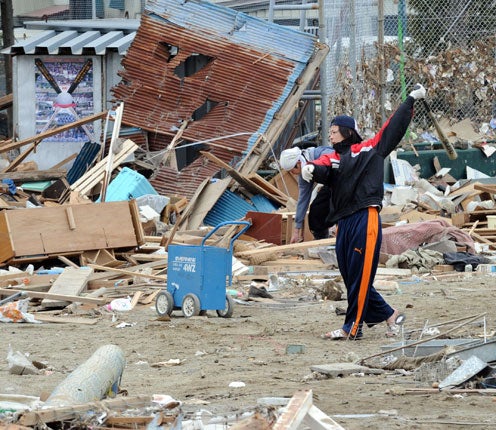Players and public hit out as baseball season begins

It's an old and often angry debate: during a national tragedy with thousands displaced, a nation traumatised and bodies still being counted, should athletes retire from the field in respectful silence – or play on? Japan's most popular sport has become the latest casualty of the country's worst disaster since the Second World War after baseball officials postponed the start of the season in one of the two professional leagues.
But the decision by the more powerful Central League to go ahead and start the season this week has angered many players and fans in this baseball-mad country. The head of the sport's union, Takahiro Arai, called the decision a mistake. "The players' consensus is that it is inappropriate to start the season when we think of those who were killed, those who are still missing and those who are staying in shelters," he told the Kyodo news agency. "It's just too early."
Nearly 9,000 people have been confirmed dead, 13,000 are missing and an estimated 400,000 are homeless following this month's quake/tsunami, while the battle to save a crippled nuclear power plant and stop it leaking radiation continues. The postponed Pacific League includes the Rakuten Golden Eagles based in Sendai, the largest big city close to the quake's epicentre and effectively ground zero of the disaster.
Most of the richer teams in the Central League have been unaffected by this month's disaster, including the powerful Tokyo-based Yomiuri Giants – the Manchester United of Japanese baseball. Giants spokesman Hidetoshi Kiyotake tried to throw cold water on the dispute, saying the athletes are playing for everyone. "Through baseball, we can make profits and send the proceeds from games to the quake-hit areas," he told Kyodo. The Giants and other teams have promised to dim lights and play shorter games.
A similar debate raged in the US as the country licked its wounds following the 11 September attacks in 2001. The controversy was resolved when President George W Bush delivered the first pitch in the Yankee Stadium at the 2001 World Series, as 56,000 fans cheered "USA! USA!" The pitch is now considered a key symbolic moment in the country's recovery.
Such scenes of nationalistic fervour are unlikely in Japan, but many fans believe that the sport could help to bring some light to a nation struggling to get back on its feet after an epic tragedy. "The country wants to maintain some sort of normality," said Ross Mihara, a baseball commentator for national broadcaster NHK. "But it's a fine line. I think it makes sense for them to postpone the Pacific League until everything settles down."
Baseball has been played in Japan since the 1870s and survived the 1923 Great Kanto earthquake, which levelled much of Tokyo, and even the Second World War, during which much American culture was outlawed.
This month's quake left Tokyo largely untouched, striking the Pacific north-east coast, especially Iwate and Miyagi prefectures. One of the game's biggest stars, Yusei Kikuchi, who grew up in that region, summed up the feelings of many players this week: "I cannot think about encouraging people by playing baseball now. The field I used to practise at, the beach I visited with my family, everything is gone now."
Some athletes have been quietly helping. Japan's most famous baseball star, Ichiro Suzuki, who plays in the US for the Seattle Mariners, announced this week he is donating 100 million yen (about £760,000) towards relief for the quake victims. The team's owner, Nintendo, has pledged another $3.7m (£2.3m) in financial help.
Join our commenting forum
Join thought-provoking conversations, follow other Independent readers and see their replies
Comments